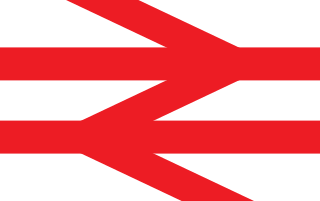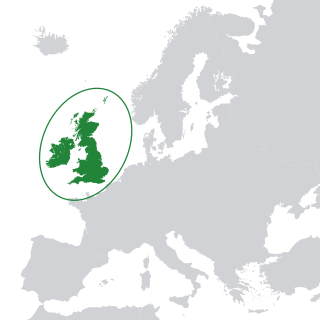
The British Isles are a group of islands in the North Atlantic Ocean off the north-western coast of continental Europe, consisting of the islands of Great Britain, Ireland, the Isle of Man, the Inner and Outer Hebrides, the Northern Isles and over six thousand smaller islands. They have a total area of 315,159 km2 (121,684 sq mi) and a combined population of almost 72 million, and include two sovereign states, the Republic of Ireland, and the United Kingdom of Great Britain and Northern Ireland. The Channel Islands, off the north coast of France, are sometimes taken to be part of the British Isles, even though they do not form part of the archipelago.

Northern Ireland is a part of the United Kingdom that is variously described as a country, province, territory or region. Located in the northeast of the island of Ireland, Northern Ireland shares a border to the south and west with the Republic of Ireland. In 2011, its population was 1,810,863, constituting about 30% of the island's population and about 3% of the UK's population. The Northern Ireland Assembly, established by the Northern Ireland Act 1998, holds responsibility for a range of devolved policy matters, while other areas are reserved for the UK Government. Northern Ireland co-operates with the Republic of Ireland in several areas.

The United Kingdom of Great Britain and Northern Ireland, commonly known as the United Kingdom (UK) or Britain, is a sovereign country in Europe, off the north-western coast of the continental mainland. It comprises England, Wales, Scotland, and Northern Ireland. The United Kingdom includes the island of Great Britain, the north-eastern part of the island of Ireland, and many smaller islands within the British Isles. Northern Ireland shares a land border with the Republic of Ireland; otherwise, the United Kingdom is surrounded by the Atlantic Ocean, the North Sea, the English Channel, the Celtic Sea and the Irish Sea. The total area of the United Kingdom is 242,495 square kilometres (93,628 sq mi), with an estimated 2020 population of more than 67 million people.

The Irish Free State was a state established in December 1922 under the Anglo-Irish Treaty of December 1921. The treaty ended the three-year Irish War of Independence between the forces of the Irish Republic – the Irish Republican Army (IRA) – and British Crown forces.

Ireland is an island in the North Atlantic Ocean, in north-western Europe. It is separated from Great Britain to its east by the North Channel, the Irish Sea, and St George's Channel. Ireland is the second-largest island of the British Isles, the third-largest in Europe, and the twentieth-largest on Earth.

The Acts of Union 1800 were parallel acts of the Parliament of Great Britain and the Parliament of Ireland which united the Kingdom of Great Britain and the Kingdom of Ireland to create the United Kingdom of Great Britain and Ireland. The acts came into force on 1 January 1801, and the merged Parliament of the United Kingdom had its first meeting on 22 January 1801.

The United Kingdom consists of Great Britain and Northern Ireland, and previously consisted of Great Britain and the whole of Ireland. Rail transport systems developed independently on the two island masses of Great Britain and Ireland, and most of the railway construction in the Republic of Ireland was undertaken before the creation of the Irish Free State in 1922. Thus, the logical division to discuss the history and present-day state of railways in these areas is by geographical division, rather than the nationalist division of nation states.
Home Nations is a collective term with one of two meanings depending on context. Politically it means the nations of the constituent countries of the United Kingdom. In sport, if a sport is governed by a council representing the island of Ireland, such as the Irish Rugby Football Union (IRFU), the term can refer to the nations of the constituent countries on the island of Great Britain and the Irish nation.

The terminology of the British Isles refers to the words and phrases that are used to describe the geographical and political areas of the islands of Great Britain, Ireland and the smaller islands which surround them. The terms are often a source of confusion, partly owing to the similarity between some of the actual words used but also because they are often used loosely. Many of the words carry geographical and political connotations which are affected by the history of the islands.

Team GB is the brand name used since 1999 by the British Olympic Association (BOA) for their British Olympic team. The brand was developed after the nation's poor performance in the 1996 Summer Olympics, and is now a trademark of the BOA. It is meant to unify the team as one body, irrespective of each member athlete's particular sport. Officially, the team is the "Great Britain and Northern Ireland Olympic Team", although athletes from Northern Ireland may opt to compete under the auspices of the Olympic Federation of Ireland instead.

Athletes from the United Kingdom, all but three of its overseas territories, and the three Crown dependencies, can compete in the Olympic Games as part of Team GB. Athletes from Northern Ireland can also choose to compete as part of Team Ireland instead. It has sent athletes to every Summer and Winter Games, since the start of the Olympics' modern era in 1896, including the 1980 Summer Olympics, which were boycotted by a number of other Western nations. From 1896 to 2020 inclusive, Great Britain & NI has won 918 medals at the Summer Olympic Games, and another 32 at the Winter Olympic Games. It is the only national team to have won at least one gold medal at every Summer Games, lying third globally in the winning of total medals, surpassed only by the United States and the former Soviet Union.

Ireland–United Kingdom relations, also referred to as Irish–British relations or Anglo-Irish relations, are the relations between the states of Ireland and the United Kingdom. The three devolved administrations of the United Kingdom, in Scotland, Wales and Northern Ireland, and the three dependencies of the British Crown, the Isle of Man, Jersey and Guernsey, also participate in multilateral bodies created between the two states.

Great Britain is an island in the North Atlantic Ocean off the northwest coast of continental Europe. With an area of 209,331 km2 (80,823 sq mi), it is the largest of the British Isles, the largest European island and the ninth-largest island in the world. It is dominated by a maritime climate with narrow temperature differences between seasons. The 60% smaller island of Ireland is to the west—together with these islands, along with over 1,000 smaller surrounding islands and named substantial rocks, form the British Isles archipelago.

Unionism in the United Kingdom, also referred to as British unionism, is a political ideology favouring the continued unity of England, Scotland, Wales and Northern Ireland as one sovereign state, the United Kingdom of Great Britain and Northern Ireland. Those who support the union are referred to as "Unionists". British unionism can be associated with British nationalism, which asserts that the British are a nation and promotes the cultural unity of the Britons, which may include people of English, Scottish, Welsh, Irish, Cornish and Manx descent.

The following outline is provided as an overview of and topical guide to the United Kingdom of Great Britain and Northern Ireland; a sovereign country in Europe, commonly known as the United Kingdom (UK), or Britain. Lying off the north-western coast of the European mainland, it includes the island of Great Britain—a term also applied loosely to refer to the whole country—the north-eastern part of the island of Ireland and many smaller islands.

The United Kingdom of Great Britain and Northern Ireland (UK), since 1922, comprises four constituent countries: England, Scotland, and Wales, as well as Northern Ireland. The UK Prime Minister's website has used the phrase "countries within a country" to describe the United Kingdom. Some statistical summaries, such as those for the twelve NUTS 1 regions of the United Kingdom, refer to Northern Ireland, Scotland, and Wales as "regions". With regard to Northern Ireland, Scotland and Wales particularly, the descriptive name one uses "can be controversial, with the choice often revealing one's political preferences".

The Great Britain national rugby sevens team is the men's international rugby 7s team that is the representative team of Great Britain. After having played at the World Games in 2001 and 2005, they made their Olympic debut at the 2016 Summer Olympics, where they won the silver medal, losing the final to Fiji.
A peerage is a legal system historically comprising various hereditary titles in a number of countries, and composed of assorted noble ranks.

The Protocol on Ireland/Northern Ireland, commonly abbreviated to the Northern Ireland Protocol, is a protocol to the Brexit withdrawal agreement that governs the unique customs and immigration issues at the border on the island of Ireland between the United Kingdom of Great Britain and Northern Ireland and the European Union, and on some aspects of trade in goods between Northern Ireland and the rest of the United Kingdom. Its terms were negotiated in 2019 before the UK general election, and concluded in December of that year. The withdrawal agreement as a whole, including the protocol, was ratified in January 2020. The UK-Ireland border has had a special status since the thirty-year internecine conflict in Northern Ireland was ended by the Good Friday Agreement of 1998. As part of the Northern Ireland Peace Process, the border has been largely invisible, without any physical barrier or custom checks on its many crossing points; this arrangement was made possible by both countries' common membership of both the EU's Single Market and Customs Union and of their Common Travel Area.













